we're not bored anymore, and we should be
postcard 57: on the importance of boredom, my relationship with my phone, and things you can do without it
Sometimes I have loved the peacefulness of an ordinary Sunday. It is like standing in a newly planted garden after a warm rain. You can feel the silent and invisible life.
prelude
“People and events don't disappoint us, our models of reality do. It is my model of reality that determines my happiness or disappointments.”
—Chess Story, Stefan Zweig
[this was originally titled doomscrolling doomsday doom, which I like a lot so I’m adding it here. also the post is too long for email, and my postcards are always too long for email, so you should always read it on your desktop or the substack app!]
When I was five or six, my dad would leave for work at the crack of dawn, and being a light sleeper all throughout my early childhood, my eyes flew open at the sound of the door. I felt my pupils dilate to adjust to the dark, like a nocturnal animal of sorts, and crept out of my room into the living room on tiptoes. Our couch was pressed against the wall right below the window, and I would rest my chin against its back and watch the world come alive inch by inch.
The London sun was sluggish and somnolent, especially in the wintertime, but it would eventually get there; after an hour, the darkness would fade into bursts of crimson and vermillion and marigold. I reveled in the quiet, my mother’s sleep-logged breathing if I concentrated hard enough, and the occasional chatter from the parking lot below from early risers. It was only when I could read the numbers on the wall clock across from me, that I allowed myself to go back to my room and pick a book to read. My mom’s voice would echo in my head still, telling me not to read in the dark because I’d ruin my eyesight, but I thought I gauged the level of brightness well enough (obviously not well enough, because I’m legally blind now).
I’d look forward to this though, the tranquility, the soundlessness of everything around me. I’m not sure why I craved this so much as a five year old, because boredom is an acquired taste, but it was something I deeply enjoyed. To truly feel every second of the hour, actually seeing the world changing with my own two eyes, was transformative for me to say the least, almost like a reward of sorts. Not to mention that I hated sleeping—something that five year old Elle does not have in common with present day Elle, to clarify. But it was less about being awake and more about the wakefulness being tangible, which was further amplified by feeling like I was the only person who was conscious during that time. My mother would wake up around seven and the world would shift back to its regular axis and universe, but the two hours between was wholly mine.
Eventually, I grew out of doing this when I slept through the sound of the door clicking shut behind my father, but I sought that feeling of having the whole world to myself elsewhere while growing up; going to the park and staring at the ducks on a bench, finding the most isolated corner of the library with a book in hand, staring at the moon and making up stories about what was going on up there, wandering the isles of the supermarket when my mom took me (and then subsequently panicking when I felt like I had wandered too far away). But the bottom line is that I had a fascination and borderline obsession with boredom, the almost torturous first few minutes followed by a calm in my heart—something which evaporated when I got my first smartphone at thirteen.
There was a time when the internet was confined to a stationary desktop in the corner of the living room in our childhood homes. Every time I turned it on, the machine would groan and whir to life, the sound sometimes deafening as I waited for it to calm down so I could click on Internet Explorer and play Club Penguin, go on Mathletics for homework, or watch a few videos on a prehistoric version of Youtube. And then I would press shut down, go up to my room, and leave the online world behind. My room was my favorite space in the whole world—it still is—and as soon as I shut the door behind me, everything within the four walls became mine and wholly mine. From the bowing bookshelves against the walls in a state of near collapse due to the number of books they were holding, to my paintings scattered all around the room, to my piano, to the loose leaf papers holding scrawls of a story I was writing—everything belonged to me and was a product of my own imagination. Owning something in its entirety like that can only be born of a complete vacuum of outside noise, and when was the last time any of us truly felt that way?
I think my generation is the last to remember a time before everything migrated online (I was born in 2000, so that makes me early Gen-Z—a few weeks ago I saw a tweet that referred to people born between 1998-2003 as “old people” and I felt downright geriatric). Retrospectively, my childhood was a thin tightrope balancing act between a past analog and a future digital world; I remember the exact moments when each social media platform became a mainstream one. I downloaded Facebook when I was nine, Instagram when I was thirteen, Wattpad (sigh) also when I was thirteen, Snapchat when I was fourteen, and so on. Many social media apps have now become defunct in my life as I feel no need to open Snapchat as an adult, and I’ve moved on from one orange writing platform (Wattpad) to another orange writing app (Substack). But I think the general consensus for people born in the same year as me, give or take three years, is that there was a tangible shift when the world’s priority mode of communication became an online one.
I voiced this to my fifteen year old sister a few weeks ago, and in return, she replied, “Sometimes you say stuff like that and it makes me realize you’re like, dinosaur-old.” While there is always no better feeling than being calmly roasted and humbled by your baby sister, having a younger sibling born when everything was already basically digital has forced me to constantly reflect on how acutely the world has changed in the last decade or so. We were raised by the same parents in the same way, but her life has looked very different to mine because of this. In my sister’s mind, there was no world before this and she never had to have this adjustment period of witnessing everything become digital and mechanical. Instagram has always existed for her. And sometimes, it’s started to feel like that for me as well. The internet, especially social media platforms, has woven itself so inextricably into the coils of my life that I’m sure that attempting to untangle it will be a futile attempt.
This is not to say that social media is monolithically terrible and every remnant of it must be done away with, like many essays that have been published in the last few months. It seems like there is a collective shift away from constantly being online, and while I agree with this, I also think nothing good can come out of dismissing these platforms as a whole, because the world has irreversibly become a place where we cannot exist without them. I’ve written so much about my experience with having a public social media account (from my One Direction Instagram account that twelve year old me ran like the Navy, to a prolific Wattpad career in my teens). I have not been without the internet for a very long time, and many of my formative memories are deeply braided with my experiences on them. And if you were on social media platforms back in its rudimentary stages, you know that you’ve completed character building for life.
Regardless of always having an online presence, my phone time has never been a point of concern for me, as it has always fluctuated within a two to three hour daily range. I’ve always preferred to access my accounts on my laptop, much like how one logs into their work computer. I was perfectly fine with having multiple social media accounts because I was good at managing my attitude and behavior towards it. Maintaining a healthy distance from these platforms, like they’re someone I know two degrees of separation over, feels essential in order to preserve my mental health and sanity. After all, we were never supposed to be exposed to thousands of people’s thoughts at once.
Not only has reading a few hundred people’s tweets a day begun to fog up my own consciousness and ability to interpret my own thoughts with clarity, but Twitter lingo has slowly started infecting its way into my everyday language. Or I’ll casually mention something that’s been going viral on Twitter, and I’ll have to painfully explain the backstory to one of my friends who doesn’t have an account—and everything online ends up sounding very stupid when you try and explain it out loud. I’ve been accessing most of my social media through apps, and it’s been the first thing I check when I wake up and the first thing I see before I fall asleep.
Thus, lately, despite all my efforts, it has become harder to separate myself from my phone. My mother always worries that I’ll lose it and often discourages me from buying the newest model when it’s time to retire my old one. I explain to her that I’m hyper aware of my phone’s location at all times, because chances are that it is glued to my hand—in short, my phone is now an extension of me. My entire life is on there, from work emails to social media platforms to texts from friends. This has bred a nervousness that was previously not there before; the thought of not clutching my phone at all times has become anxiety fodder. I’ve even experienced physical symptoms of this in the last few months: my right wrist has started hurting, in a dull-ache, pseudo carpel tunnel sort of way, from scrolling on my phone for too long. Or maybe I actually do have carpal tunnel and I’m just in denial. All of these have led me to reach a terrible epiphany—I may not only be chronically online, I may also have an addiction to my phone. As soon as I began to feel my attention span withering away like a cut flower without water, I was forced to step back and ruminate on what has changed regarding my behavior.
For the first three months of the year, I was waking up at 4am for no reason, and the first thing I did was reach for my phone. I was barely conscious and totally not functioning at this point, and my one eye was squinted shut like a bad prolonged wink, but I still checked my messages. I’d sleepily text some people back and then open Substack and Twitter, the blue light from my phone laser-cutting into my retinas, probably causing irreversible damage that I’ll resent myself for in a decade when in desperate need of Lasik. But a deeper reflection reveals that perhaps I’m just afraid of being bored now, something I actively sought as a child. What if I can’t fall back asleep and I end up staring at the ceiling, bored?
Boredom almost unilaterally carries a negative connotation—if you are bored, you need to figure out a way to fill that boredom with something, which sometimes simply includes opening the same fridge over and over every five minutes just to see if new food has magically spawned on the shelf. I don’t mean to beat a dead horse because we have talked about this topic into oblivion, but perhaps this is indicative of the instant gratification society that we have turned into. Even using AI and generative AI as a solution to everything without thinking for a second is symptomatic of this. I always say that a walk outside in the sunlight can be a quick fix to so many problems, and that’s because living in the digital world, with constant stimulation from social media posts and playlists and podcasts in our ears, sometimes makes us lose the ability to quite literally touch grass.
A 2017 article explains this feeling of boredom as ‘ecological boredom’, saying “because we’re bombarded with increasing doses of glamour, glitz, buzz, celebrity, hype, and excitement, we initially find the natural world mundane”, which feels even more true eight years later. While I am not advocating for all of us to suddenly throw our phones out of the window and become prehistoric hunter-gatherers, I do think there is substance in that sentence, that we have always historically viewed nature as awe inspiring and we oftentimes no longer do, due to the constant information overload and ten second reels and scrolling through a hundred people’s thoughts at once in the span of ten minutes. In short, we have quite literally forfeited our ability to feel awe for overstimulation from content. And awe is arguably the most important emotion we can have.
Boredom is seen more as a void and a black hole in our lives instead of a blank canvas that can transform into something new and something creative. In a complete vacuum of distractions and outside noise, we are able to think in depth, create more freely, and form clear opinions of our own. Our attention spans are shrinking as we use the instant gratification of social media and short form content as a quick fix to the few initial discomforting moments of being bored. Boredom is as important for our personhood as much as any other emotion, but we’ve become afraid of silence and only hearing our own thoughts. In a way, our mind has become a disfiguring version of a Greek chorus, filled with a low hum of background noise from people we will never encounter in real life.
I am absolutely guilty of this. I recently wrote about this in my “how to get smart again” post, that my addiction to instant gratification has not only messed up my attention span, but also has bled into the way I live my life. I’ve gotten even more impatient, which was something I didn’t know was possible because I’m already such an impatient person to start with. Because boredom is almost a foreign feeling for me at this point, with my phone within my immediate reach at all times, it’s become even more unbearable.
Not allowing myself to think has also created unexpected byproducts, such as not walking places (and wanting to take a bus or car instead) and mild decision paralysis—the most shocking revelation to me, as someone who knows exactly what she likes and dislikes and doesn’t take more than five minutes to make any decision. Trying to learn how to be bored again quite literally feels like having to painfully detox the addiction of avoiding being bored at all costs, and rewire my brain into seeing boredom as a positive quality again.
Is doing this difficult? Yes. But do I absolutely dread what my life will be if I don’t learn how to be bored and learn how to think again? Absolutely. Boredom is agitating and even unnerving sometimes. What’s even more terrifying to me though, is the notion that I will one day self medicate myself with mind numbing media so much to the point where I am incapable of forming my own opinions. Don’t you agree that it is the fastest way to self sabotage and ruin your intellect and your ability to discern what is and is not important in life, or to feel awe?
I wrote this last paragraph in my essay back in October about the rise of generative AI, but I think it’s also pretty apt for this essay as well:
The art of letting things linger has become something archaic, lost in the steeps of corporate greed and between the axis of a cost benefit model. Everything is moving in super speed that feels different than a few years ago, like we are recklessly surpassing the speeding limit as a society and we are waiting for the inevitable crash.
Can nobody see it?
On a more optimistic note: here are some things you can do without being on your phone or a digital screen at all—
cook or bake a favorite recipe
meditate
journal a few pages
read a short book
go on a walk
paint
clean your room
learn how to knit or crochet
make something out of air dry clay
write someone a letter
do a puzzle
go on a run
paint your nails
learn origami (fold a paper crane!)
fill in a coloring book
go to a farmer’s market
scrapbook
take a bath
Or, you know, just let yourself be bored for a second.
Postcards by Elle is a reader supported publication. Every week, I send out a weekly postcard, which includes a list of everything I read (books and articles) and watched (movies and video essays) that week. To support my work, please consider upgrading your subscription!
Here is my new series for paid subscribers that will be posted throughout the summer:
interlude i: what i read this week
Here is my Goodreads if you want to add me!
I’ve been (very slowly) making my way through Vineland by Thomas Pynchon. I’m really not a huge fan of him and reading parts of Gravity’s Rainbow for one of my college courses was painful at best, excruciating at worst. But I’m actually really enjoying it. It’s very different from any classics I read or even contemporary books and the amount of bizarre information casually given in a paragraph is oftentimes overwhelming. It’s a pretty short book (compared to Pynchon’s other books), but it is really manic and everything about it feels pretty technicolor, so it might take a long time for those of you who are not used to it (including me). I’d recommend this to anyone who enjoys writing about the hazy 60s counterculture in California—the Joan Didion/Eve Babitz time period but the writing is not!!!! like them at all, be aware.
To balance out the overwhelm, I’m also reading A Way of Life by Any Other by Darcy O’Brien. I’m only a dozen pages into it but it’s pretty good so far. I am a little apprehensive of the 3.5 star review on Goodreads, but
and I always say that 3.5 is the sweet spot rating for a good literary fiction book because it means that it’s complex and interesting enough that it polarizes the general public. I’ve also just learned to blindly trust any NYRB classic, to the point where I am thinking of exclusively reading them all summer so I can do a huge NYRB classic guide sometime in August.Here are ten articles to read this week:
It Must Be Nice to Be a West Village Girl by Brock Coylar
A new generation has transformed the neighborhood — and reshaped the fantasy of New York City living.Awe Can Do Wonders for Your Well-Being by Alisa Hrustic
It’s the closest feeling we have to magic, and it can have profound effects on your mind and body.Casual Viewing by Will Tavlin
Why Netflix looks like that.Our Narrative Prison by Eliane Glaser
The three-act ‘hero’s journey’ has long been the most prominent kind of story. What other tales are there to tell?Incense Perfumes on the Eve of the Conclave by
My Brain Finally Broke by Jia Tolentino
Much of what we see now is fake, and the reality we face is full of horrors. More and more of the world is slipping beyond my comprehension.-
put down the AI. pick up a dictionary. The Grays of Our Lives by Kyle Chayka
On clothes, color, and anxiety.Everyone Is Cheating Their Way Through College by James D. Walsh
ChatGPT has unraveled the entire academic project.Who Decides What Words Mean? by Lane Greene
Bound by rules, yet constantly changing, language might be the ultimate self-regulating system, with nobody in charge.
interlude ii: what i watched this week
Here is my Letterboxd if you want to add me!
I haven’t really been watching a lot of movies (but I am planning on getting on my Criterion channel grind in the summer, as I mentioned here). I did finally watch Babygirl, and to be honest, I didn’t really…enjoy it. It was a good movie, I just thought that the plot kind of deflated in on itself by the last third of the movie. I’m actually glad that I didn’t watch it as a Christmas double feature last year, because Nosferatu was near perfect and this one was a letdown. I also rewatched Crouching Tiger, Hidden Dragon and it is still as good as I remember. The score is one of the most stunning soundtracks for a movie ever made.
Show wise, I’m watching Sex and the City from start to finish for the first time. I’ve watched a few episodes here and there and basically know what happens in the end because it’s impossible to avoid, but watching it in my mid-20s feels weirdly eye opening in a way. I’m at the start of season 4 and I’m starting to experience show fatigue because I’ve been binging it too fast. I’ll have an essay up about my thoughts in a bit.
I’ve also been slowly making my way through The Rehearsal, and it is just so good. I’m still on the first season (and I’ve heard from friends that the second season is much better), and I’m convinced Nathan Fielder is a genius. I’ll write more about the show when I’m on the second season because I haven’t watched that much yet. But!! I haven’t enjoyed watching a show this much in a while.
postlude
things i love: the sunlight, haribo starmix, bacha coffee candle, cold brew at lunchtime, sally when the wine runs out by role model, making sandwiches, eating sandwiches, hearing what people put in their sandwich, and this playlist i made—





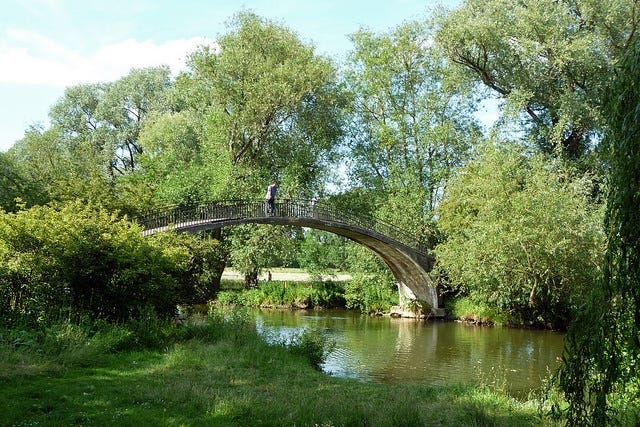
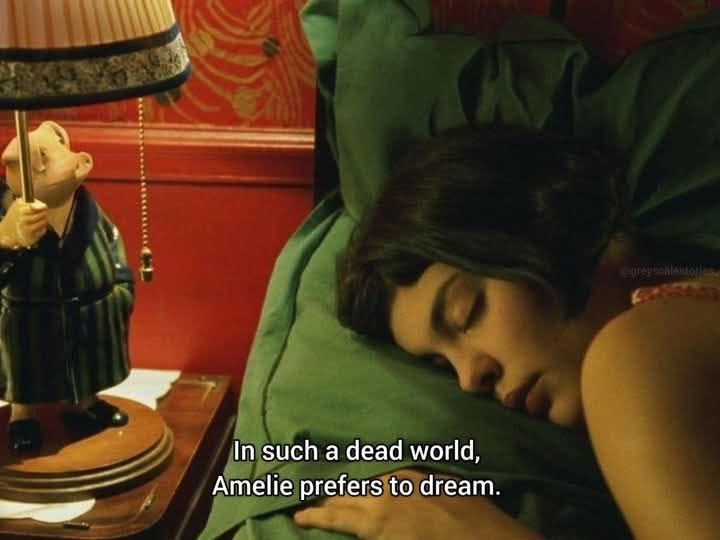
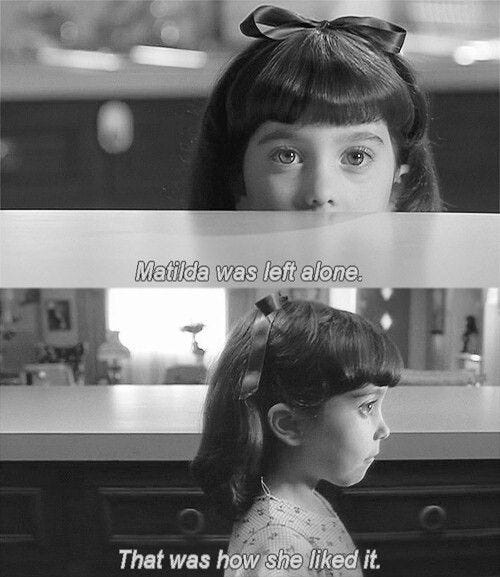
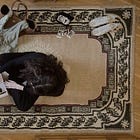
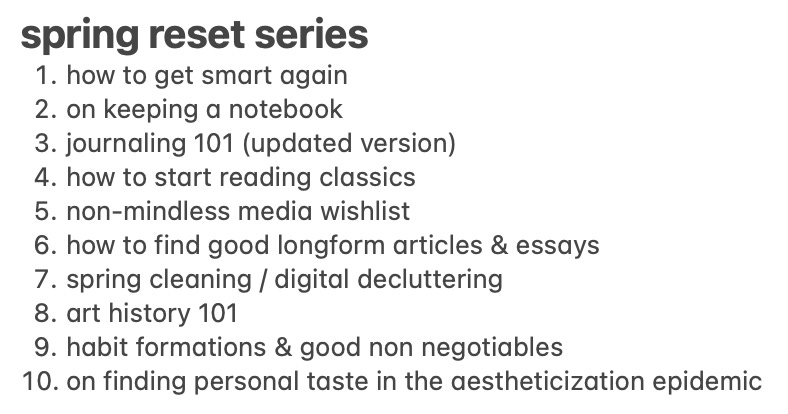


In my childhood I knew absolute boredom. Kids today cannot unless it’s by choice. There is ALWAYS something interesting you can do.
I do miss a measure of boredom in my life. I also had a bedroom full of things I created growing up and I loved it. Creation is such an important human act. Nowadays, I reach for my phone not just out of boredom and habit but because I'm tired. It's a quick fix way to connect and be entertained while resting. There is a fine line though between resting and binging which is so easy to cross.